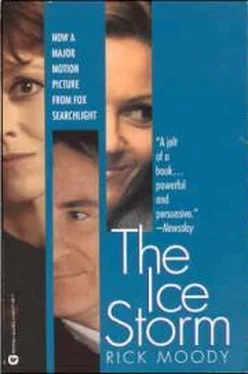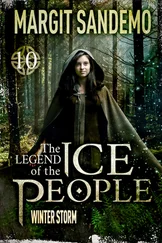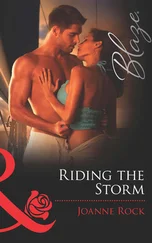— Well, let’s go to that bar, he said.
— I don’t know. I’m so wasted…
— Don’t you just want to…. Don’t you want to get out of your head one time before going back to school? Don’t you want to celebrate one night? Just one time? You’ll be okay, right? I’ll make sure you get home.
— Maybe, Libbets said. Maybe, if we take a cab.
This was about ten o’clock.
He called home first. He was supposed to keep his mom up on his movements, but the main thing was that he wanted to talk to his sister. He wanted to tell her how this wasn’t going to work, how no girlfriend was ever going to work, and how he was always going to live in this windowless vault where no one ever touched his skin. His body, he wanted to tell her, was like the sweating wall of a wine cellar. He breathed the musty air of crypts. He couldn’t sit still. But he didn’t tell Wendy any of this. Whenever he told someone in his family this kind of thing, they always asked him if he could pass the dill spears or the apricot chutney. Would he mind taking out the trash? So he never did tell. He just got off the phone.
Libbets had an inexhaustible roll of bills her parents had given her. She handed the roll to Paul. She couldn’t concentrate on the denominations. The snickering doormen had the cab waiting for them. Seventeenth Street and Park Avenue South. Paul tipped big.
The sign at Max’s said Big Star. Two shows. From the street, he could hear their sweet harmonies. He held Lib-bets close, and they listened to the band for a while. From the street. Right out on the sidewalk in front of Max’s. Because this was the closest they were going to get to that bar. All the way down there, and they couldn’t get in. The bouncer frowned and pointed. Out. Paul Hood was sixteen years old and Libbets Casey was seventeen and they both looked like it. They weren’t dressed in black jeans and black turtlenecks and they didn’t dye their hair. They were a couple of preppies with fake identification cards — Citizen of the State of New York cards — who thought they could buy their way into any bar. They stood out in the cold, and taxicabs drove the slush and water out of the drainage depressions and up onto the curb. Pedestrians scattered.
They watched the parade into Max’s Kansas City. The rock and roll that was king in November of 1973 was Glitter. The New York band that was king was the New York Dolls, a collection of guys from the boroughs who wore makeup and fake furs. They had played recently at the Waldorf-Astoria, and at the State Theatre in New Brunswick. Their big hit was “Personality Crisis.” Mott the Hoople was also playing in New York that month. They had started out playing the usual Stones-imitation stuff, but by 1972, when All the Young Dudes was released, their costumes had become more creative. Lou Reed was playing at the Academy of Music, just down the street, in a couple of weeks. This was Glitter. These men all wore platform shoes and boas and blouses and leather jumpsuits. They were writing songs about transvestites — Holly Woodlawn, Candy Darling, Sugar Plum Fairy, Jackie Curtis.
In Paul Hood’s November issue of Creem, one rock critic called 1973 “the year of the transsexual tramp. All of a sudden almost everyone in rock n’ roll wanted to be — or at least suggest the possibility of being — a raging queen.” Even Dick Clark had an opinion on the subject, in the same issue: “Bisexual… what’s the other word, AC/DC? I think it’s partially fad and partially goldfish swallowing, as protest was. A lot of kids got into protest because it was ‘the thing.’ That may be what’s happening with the fag-drag crazy transsexual rock scene. I think that’s a quickie. I think more importantly that’s an indication of the desire to have show business return to music. That’s why you have an Elton John, a Liberace, an Alice Cooper. That’s show biz. We all know Alice is a put-on, a shuck. But what’s funny is when you read the sociological commentators and how torn up the whole straight world is over this craziness. I can’t attach any significance to that.”
The Factory, on Union Square, wasn’t far from Max’s Kansas City. If Paul Hood had known, he might have been able to identify Andy Warhol. He might have seen that platinum blond eminence sweep by into the club. Warhol had been in Rome filming Frankenstein and Dracula in the summer of 1973, but by now he was back and hard at work revamping his magazine, Interview, which included the following item in the November 9 issue, concerning a dinner at Pearl’s, a Chinese restaurant: “Bob Colacello in his emerald green corduroy suit by Polidori of Rome, Yves Saint Laurent silk shirt, Givenchy cologne; Vincent Fremont in his dark brown custom-tailored gabardine jacket, tan pants, white Brooks Brothers shirt; Jed Johnson in blue Yves Saint Laurent blazer, light blue Brooks Brothers shirt, striped tie from Tripler’s, New Man pants; Andy Warhol in his chestnut DeNoyer velveteen jacket, Levi’s, boots by Berlutti di Priigi, Brooks Brothers shirt, red and gray Brooks Brothers tie, brown wool V-neck Yves Saint Laurent pullover.”
But because of the Valerie Solanas shooting, because he had scaled back his public appearances, Warhol didn’t go to Max’s on Friday night. Meanwhile, Glitter hadn’t made it to the Stamford Local. Edie was a real tragedy — many in New Canaan and Greenwich and Darien knew her family personally, and they held Warhol responsible. There was no Glitter in New Canaan, and none in New Hampshire, where Libbets and Paul went to boarding school. They were cold, standing there, trying to figure out what to do. And Libbets was feeling sick. This was what night-life was like when you were sixteen or seventeen and you had enough money to go anywhere in New York City. Paul thought about going into Union Square Park, with its dense shrubbery and rich vein of drugs and crime. But he knew he would only end up with his usual fare — totally awesome oregano. They could go to another bar. One of those holes-in-the-wall on the Upper East Side where few questions were asked. But the fact that he was going to have to part from Libbets’s side eventually was dawning on Paul. The necessitites of travel lurked in him. He needed his last ten dollars. To get home.
— Let’s go back, he said. We shouldn’t have come down here. It’s my fault. I’m sorry. I’m really sorry. I’ll take you back up to your place and then I’ll go.
— I’ll just… drop you, Libbets said.
— No, no, he said. I’ll take you back. You’re not feeling well.
Purest helplessness passed across Libbets’s face. She shivered and frowned and bowed her head in a strange, almost grief-stricken way. And then she vomited on the street in front of Max’s Kansas City. It was a thick, white soup and Libbets spewed it with the compressed fury of a fire hose. She doubled over. When it reached the slush and mud and water, those gloomy little ponds of Manhattan treachery that had overflowed corners and collected in gutters and potholes, it steamed like some radioactive substance. Some of the vomit splashed on Paul’s Top-Siders, which were wet through and through now, and he jumped up, as though there were a way to escape it. As though it would be possible somehow to ditch her there. But he couldn’t even wipe the stuff off. He couldn’t do it until she was safe at home.
He was out with a woman who vomited in public.
— Sorry, Libbets moaned, oh, God, sorry—
He was propelled by this horror out onto Park Avenue South to hail a cab. He waved desperately at the traffic. Libbets was crying as he helped her in. It was the day after Thanksgiving and her family had gone away and hadn’t invited her. They had gone away on a ski trip. Paul saw her predicament, and his own. He wished he could have spirited her to safety like a Human Torch, like a roadrunner. Abandonment was in the parlors of America, in the clubs, in the weather. He wanted to abandon her, too, this vomiting girl. He loved her and he wanted to abandon her. It was 10:28.
Читать дальше












